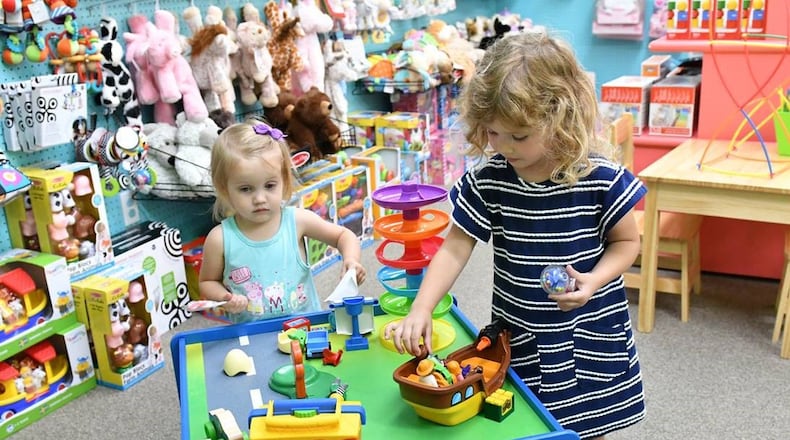The Trump administration recently agreed to scale back its 145% tariffs charged on imports from China to 30% — at least for 90 days. The Chinese government also reduced its retaliatory import taxes on U.S. goods from 125% to 10% while both sides continue to arrange a deal.
But before the pause on the tariff spike was announced, many businesses were trying to buy products before tariff prices hit earlier this month.
Cathi Hall, the owner of Topsy Turvy Toys in Tipp City and other Ohio cities, said tariffs have already impacted her business. One of her suppliers, based in Canada, told her earlier this year that it would be raising its prices by 35%.
On April 15th, I was notified that I only had two payments left on the Emergency loan that I took out in order for my...
Posted by Topsy Turvy Toys on Wednesday, May 14, 2025
Numerous other suppliers from China and other nations sent her emails to let her and other businesses know that they would be halting production or increasing their prices starting in May. Hall took out a loan and stocked up on product in the final week of April to avoid the increased prices.
The toy shop owner announced tariff impacts on her business on social media this week.
“It was significant,” Hall said. “I purchased product for three months within three days, not exaggerating, and took on that business loan hoping that the economy would stabilize and that my customers would be able to afford product. That was the other scary part of it — do my customers have that budget to continue shopping?”
The Toy Association estimates that 96% of American toy companies are small- and mid-sized businesses. Roughly 50% of these trade organization members reported that tariffs could put them out of business.
In Oakwood, Blue Turtle Toys owner Cathy Tapogna said she also attempted to stock up on product ahead of the tariff hike. But she found that her typical vendors were rather low in stock. She received a 15% surcharge on one of her orders, and she said that, unfortunately, that will likely be passed onto the consumer.
“I feel I’m pretty well stocked to get through the next 30-60 days,” she said. “I’m expecting a lag in the supply chain, but not as bad as what we experienced with the pandemic.”
Tapogna said she’s holding off on other orders until June.
The pause on tariff increases may provide relief to businesses who import goods from China, but a 30% increase is still steep for small business owners, Hall said.
“My concerns are still as valid as they were with the 145%,” she said. “We just don’t have as much impact as other companies, the big box stores.”
More worrisome are supply chain issues. Hall said she stocks her stores with toys people can’t find at major retail locations — she says that’s what draws her customers in. Hall said she’ll have to adjust her buying patterns in order to stock her inventory with toys that are available and affordable.
“I will find product for customers at the price they can afford,” Hall said. “But this is overwhelming, stress-inducing. It’s the unknown that’s scary.”
Even large retailers will be raising their prices on toys, electronics and more that are imported from China. Walmart’s CEO announced on Thursday that the company would be raising its prices on items with higher tariffs, and those price hikes could go into effect later this month.
Retailers say they have no choice but to raise prices to offset higher costs from tariffs. And they are also bracing themselves for higher shipping costs fueled by a surge of companies racing to get their goods on ships to the U.S., the Associated Press reported.
Even amid the looming anxiety, Hall said the toy industry is joy-infused by nature.
“I can tell you what happy is: happy is summer, and happy is the number of gifts we’ve wrapped for preschool and high school graduations this week,” Hall said. “Everyone is purchasing fresh bubbles and sidewalk chalk. All of those things are full of joy.”
About the Author


